
The last Saturday in April is Independent Bookstore Day, which made me think of such bookstores I have known and loved. The first was during my college years in Athens, Ohio. Logan’s was way more than a bookstore. One could buy Ohio University memorabilia and textbooks, of course, but also everything from greeting cards to Vanity Fair underwear!




Independent bookstores are more than just stores; they’re community centers run by passionate readers. They are as good as secondhand bookstores in offering the possibility of serendipitous finds. In addition, they support the local economy through job creation and tax dollars. So buy local!
Independent Bookstore Day is a one-day national party that takes place at indie bookstores across the country. Every store is unique and independent, and every party is different: authors, live music, cupcakes, scavenger hunts, kids events, art tables, readings, barbecues, contests, and other fun stuff. Check out what’s happening in your area!
In a world of tweets and on-line searches, bookstores are not dying out. They continue to grow and expand and enrich the lives of readers and communities. So prepare to party down tomorrow!
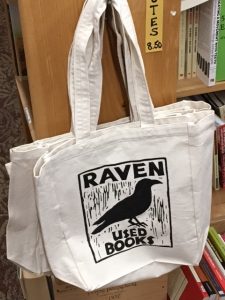
I recently visited one of my favorite bookstores, the Raven, in Northampton, MA. I came away with three treasured books.
You may know that I collect dictionaries. And yes, I have shelves of them. What makes this one worthy of acquisition is that it spans multiple English-speaking locales. For example, the noun gam is British for oral sex, but in Australia it is a sanitary pad or tampon. The noun crack in the US refers to the drug; in Ireland and Britain it means a good time but when preceded by “the” it means what’s going on the latest news, or current ambiance. It’s also a vulgarism for vagina in all English-speaking areas. (Lots of slang refers to sex acts and genitalia.)
As an adjective, it’s British for top-notch or first-rate. As a transitive verb, it means to share or split.
(N. B., the meaning of slang often depends on context.)
My second find is a compilation of anecdotes and their attributions. More accurately, it’s a list of sources and related stories. For example, under Mark Twain there are 23 entries, such as “In a world without women,” Twain was once asked, “what would men become?” He replied, “Scarce, sir. Mighty scarce.”
The backmatter includes a source list, bibliography, index of names, and–perhaps most valuable to writers– a subject index.
Last but not least, I bought a book of insults. They are so often creative and funny. “He smokes the kind of cigars that leave you smellbound.” The contents are organized by subject.
One reason to love used books: they’re inexpensive. I got all three of these for $20.03, including taxes. The best prices are usually at library book sales or at yard/tag/garage sales.
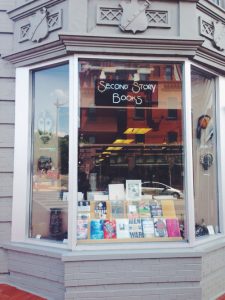
I browse used bookstores more broadly than others. When I entered the Raven, I wasn’t looking for the books I bought!

The Tattered Cover is another favorite of mine, though it is technically a hybrid: it sells both new and used books.
BOTTOM LINE: Check out used bookstores. You might surprise yourself!
Interested in learning more about writing? Join me at Agile Writers for my class on Write Your Life: Memoir and Memoir-Based Fiction. For more information, visit the Agile Writers website.
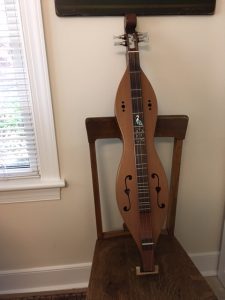
In high school I played percussion, but I never mastered a tuneful instrument–which I’ve always regretted. So, I recently started taking dulcimer lessons. The instrument and the music are rooted in Appalachia, as am I. In short, it’s important to me.
But so far, I’ve managed only one lesson and one practice per week– usually the morning of the lesson. This is not the road to proficiency!

I truly intend to practice, but there’s always something else to do first. Make the bed. Empty the dishwasher. Celebrate my birthday with my bridge buds.

Write my twice-weekly blogs. Submit a short story. Come up with and deliver a couple of tattoo stories to honor Amy Black. Spend Easter with my family in New England. And on and on.
AND THAT BRINGS ME TO FIRST THINGS VS. IMPORTANT THINGS.
It’s easy to fill your life with things that are right in front of you–or that have a date certain–and never get around to some things that are truly more important.

When my children were little I often lamented the clutter and mess in my house. (I was a psychology professor at the time.) One day a friend with four children just older than mine said, “If they aren’t doing structural damage, don’t worry about it.”
Which brings us to the point: LOOK AT HOW YOU SPEND YOUR TIME AND DECIDE WHICH FIRST THINGS CAN BE MOVED TO LAST. If writing is truly important to you, make time for it.
And so, off to practice dulcimer!
Interested in learning more about writing? Join me at Agile Writers for my class on Write Your Life: Memoir and Memoir-Based Fiction. For more information, visit the Agile Writers website.

And never an explanation or even a mention of the jarring juxtaposition of ethnic heritages. Perhaps it is time to revisit issues around character naming.
I wrote a blog post in October 2015 about character naming. Let’s review:
Consider your name.
How was it chosen? What does it mean? How does it look? How do you feel about it?
My father John shared his name with a brother of his mother. My mother’s, Alta Wavalene, came from her father’s youngest sister and her mother’s youngest sister. There are no Vivians on either branch of the family tree. Were my parents consciously striking out in a different direction?
One story I heard growing up is that Vivian was the name of my father’s first girlfriend, and he liked it. So, does this reflect my father’s dominance or my mother’s confidence?
Vivian means lively, and likes bright or vivid colors. The latter definitely applies, and I like to think the former does as well. As for appearance, Vivian is all spikes and angles, especially when written in caps: VIVIAN. Hmmmm. No comment. But I do know I felt out-of-place among the Sharons and Shirleys and Barbaras. As a child, I wanted a nickname and it was never forthcoming. As an adult, I like that I have seldom come across another Vivian, and only an Italian chef ever called me Vi.
Consider character names.
Your characters’ names are as important to them as yours is to you. Give them some thought. As with everything, there are books out there to help. My personal favorite is Character Naming Sourcebook by Sherrilyn Kenyon. For one thing, it starts with an overview of things to consider. In brief, and paraphrased, the ten guidelines are:
Your character’s name is the usual introduction to the reader. Lydia is harder than Nora. Cynthia is more upscale than Bertha. Bart is stronger than most two-syllable male names.
In deciding on names, avoid not only the beginnings, but the endings. Alex, Alice, Amy, and Andrew will confuse readers and turn them off. At the same time, choose nicknames and/or endearments with care. I recently critiqued a manuscript in which William was Billy to the family, Victoria was Vickie,
Margaret was Maggie, Susan was Suzie, and endearments were honey and sweetie. Not a big deal, but if the reader notices, it’s too much.
I like Character Naming because of its breadth, and because it separates names by ethnic roots and meaning. But it isn’t the only book out there. Indeed, you can go to a local telephone directory and mix first and last names.
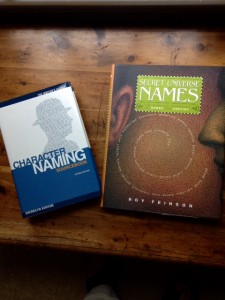
And if you are interested in the humorous side of writing, consider these:
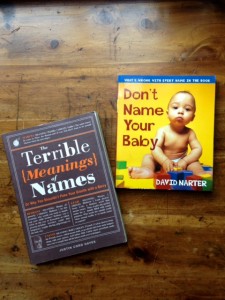
That way you won’t inadvertently name two friends Barbara Smith and Barbara Morton and end up with BS and BM!
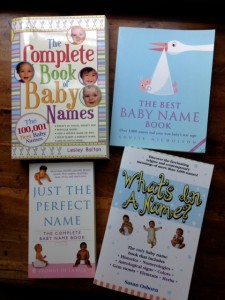
Consider perception.


